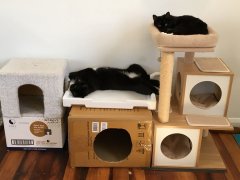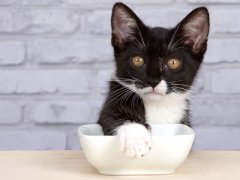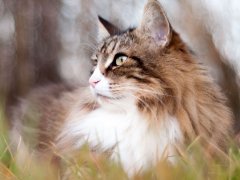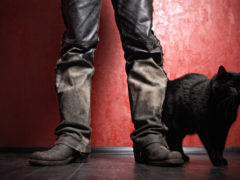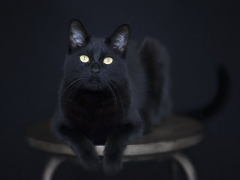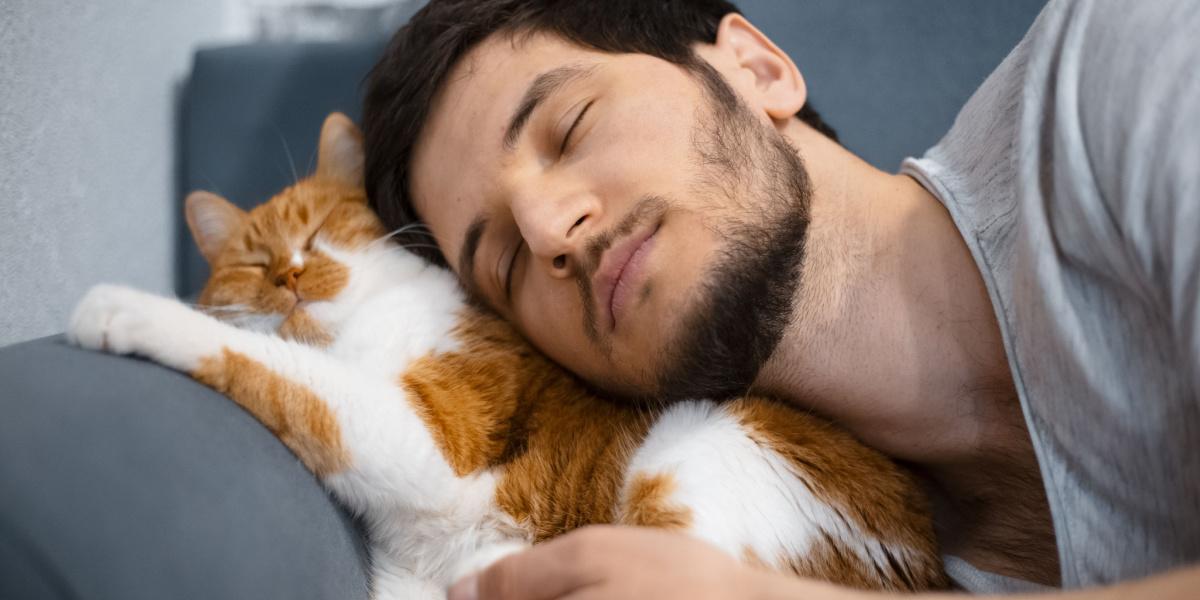
Cats are often mistakenly thought of as distant and aloof in nature. But they can be very loving animals, who express affection in their own ways. Some even like cuddling and snuggling.
If your cat is a cuddler and you are wondering why they are, read on to find out more. We’ll also explore why some cats enjoy it while others don’t.
Cats cuddle and snuggle for a variety of reasons, including warmth, affection, and the feeling of safety. Both genetics (your cat's breed) and early life socialization determine how snuggly your cat will be as an adult. If your cat loves to snuggle with you, be sure to respect their boundaries and ensure that cuddle time remains a positive experience for both of you.Key Takeaways
Reasons Why Cats Like to Cuddle and Snuggle
For Warmth
You might have noticed that your cat always seems to seek out the warmest spot in which to make themselves comfortable. In fact, they will have been doing this since they first entered the world.
Newborn kittens can sense temperature and have been found to actively move towards warmth. As they can’t regulate their own body temperature until they are around 3 to 4 weeks old, they snuggle together with their mother and littermates to keep cozy.
Your cat cuddling with you can be seen as an extension of their kittenhood behavior. Cats also have a higher body temperature than we do. If your cat can use you as a heat source, then they can spend less energy maintaining their temperature. It’s a win-win situation – you can both keep each other warm!
To Feel Safe and Protected
This is also a behavior your cat will have carried forward from kittenhood. When they are young, they are very much dependent on their mother for warmth and protection. If your cat has a trusted bond with you, they will feel a great sense of security in cuddling up close to you. They are paying you a wonderful compliment!
For Attention
Your cat might have learned that jumping onto your lap for some cuddles is one of the best ways to get your attention and have some interaction. When they have snuggled into you in the past, most likely you will have given them a stroke or spoken to them gently. This sort of positive reinforcement will have encouraged them to repeat the behavior.
For Bonding and Companionship
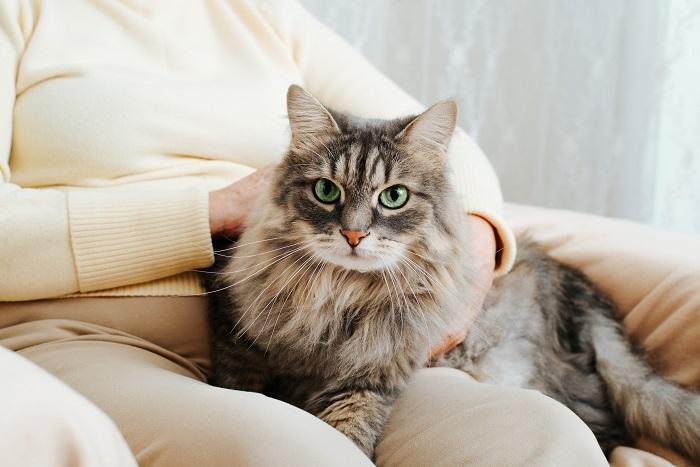
Snuggle time gives your cat an opportunity to bond with you and deepen your relationship.
Your cat might simply enjoy your company and want to be as close to you as possible to show affection. If your cat likes cuddling and snuggle time with you, it can be a wonderful bonding experience that helps to develop love and trust.
So, Why Do Some Cats Like Cuddling, While Others Don’t?
It all depends on their behavior and personality, which are determined by their genetics and the environment in which they are brought up.
The Role of Genetics (Nature)
Genetics has some contribution to a cat’s temperament. Over the years, pedigree cats have been bred for certain physical and behavioral characteristics. Breeds that are generally more relaxed and low energy tend to be affectionate and enjoy being lap cats. These include:
Of course, there is no guarantee that all cats of the above-listed breeds will turn out to love cuddling as there are many other influencing factors. Higher energy breeds, such as Abyssinians and Bengals are much less likely to be tolerant of cuddling.
Previous studies have also shown that kittens can inherit personality traits, such as confidence and friendliness, from their fathers.
The Role of Early Socialization (Nurture)
The key time for socialization is when a kitten is between 2 to 7 weeks of age (the ‘sensitive period’). During this time, there is constant learning and the experiences they go through will have lasting effects on their behavior and personality.
Kittens that have been well handled by different people before they reach 7 weeks of age have a better chance of growing into friendly, confident adult cats. These are the ones that are more likely to enjoy some cuddling time. On the other hand, kittens that have had no, or very little, handling are more likely to be nervous and fearful, and later attempts at socialization might not be successful.
Final Words
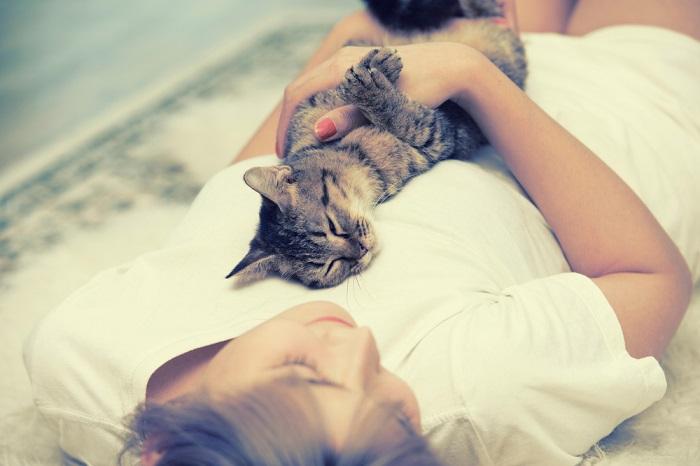
Cats cuddle and snuggle with their owners for a wide variety of reasons. If your cat is a snuggler, respect their boundaries and appreciate the attention and bonding!
So next time your cat cuddles or snuggles up to you, you’ll know that they could be looking for warmth, safety, attention, or companionship. Or a combination of them all!
You’ll also have a better understanding of why your cat might like cuddling more than others. It’s always important to remember that these interactions should be done on your cat’s terms.
Even the friendliest, most affectionate cat has their boundaries, and you don’t want to overstep them and damage the trust between you. If your cat shows signs of stress or annoyance, it’s best to stop and let them move away if they so wish to. That way, you can maintain cuddling as a pleasurable bonding time for you both.
Also Read: How To Safely Play With A Cat, According To A Cat Behaviorist
Frequently Asked Questions
Do cats like to be hugged?
Some do, some don’t. It all depends on their individual personality. If your cat likes being hugged, they might press themselves closer to you and rub their face against you. They might also purr in appreciation.
If your cat doesn’t like being hugged, the stress can trigger their ‘fight, flight, or freeze’ response. They might hiss and scratch, or try to run away. If your cat freezes, you might mistakenly think they are happy to be hugged. Look out for signs of stress in their body language. As with most things, it’s best to do things on your cat’s terms!
Do cats bond by cuddling?
Yes, some cats might choose to bond with their pet parents in this way. Some dislike being picked up and held but will enjoy snuggling in their pet parent's lap. Being close to your cat helps reinforce a special bond.
My cat doesn’t like being hugged. Does this mean they Don’t like me?
All cats come with different personalities. Don’t take offense if your cat doesn’t enjoy a good cuddle – quite a lot don’t. It doesn’t mean your cat doesn’t like you. For many, being hugged can be overwhelming. There are other ways to nurture a strong bond with your cat, such as scratches under the chin, a belly rub, or a grooming session. Take some time to find out what your cat loves instead.
-
Atkinson, T. (2018). Practical Feline Behaviour. Oxfordshire, UK: CAB International
-
Fraser, A. (2012). Feline Behaviour and Welfare. Oxfordshire, UK: CAB International.

